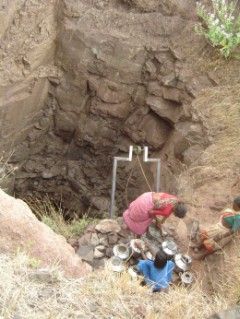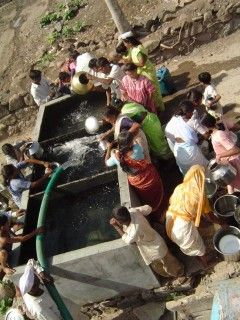It is a familiar sight during water shortages; when the precious liquid no longer flows in our taps, scores of tankers distribute water. Nearly always, this water is emptied into buckets, but in sharp contrast, during the drought of 2001-2004 in Maharashtra, a different practice was followed. While the government sent water tankers every day to villages, rather than empty these into residents' buckets, the water was poured into wells that had gone dry, some as deep as 60 to 100 feet. With villagers forced to congregate around the well to bail the water, this led predictably to scrambles, many of them violent.
The result? Women and girls often risked life and limb, precariously bending over the well, many of which had shabby or no parapets to rest on. And serious injuries did occur - Swati Thite of Kendur village and Sangeeta Choudhuri of Choudhriwadi hamlet of Pabal district in western Maharashtra, suffered serious spinal injuries as they slipped on the ground in the ensuing scramble. Many others suffered minor back injuries. These incidents raised the obvious question - why can't water tankers directly empty the water in individual buckets, like they do in cities? Apparently, government authorities decided that this practice led to quarrels, and to teach the residents a lesson on the value of water, a bureaucratic decision was taken to empty the water into wells instead.
The sarpanch of Tathawadewadi village, Pandurang Tathawade, says that "Because the water was released into the well instead of buckets, it caused immense hardship to our women, and the water they pulled was also muddy since the wells were dry. The mad scramble is also due to the government rule of emptying tanker water in wells at every 1.5 km distance only. Which in effect means that only one well in every village got filled and women hovered around it, leading to accidents. In my hamlet itself, one young man died after he fell into the well while drawing water and at least four women have suffered back injuries."
Today, however, Tathawade is a very pleased man. Coming to the rescue of the womenfolk who are taken for granted and giving a snub to the high-handedness of the government authorities, an indigenous and innovative alternative has made life easy for the women. This sterling example has the potential of being replicated in villages all over India as it can be adopted with ease and does not involve high costs.
Thanks to a team of youngsters from Pune who voluntary came forward to provide a safe alternative, in Tathawade, two ferrocrete tanks (storage tanks made of wire mesh with cement lining) of 5,000 litres capacity each were installed in the vicinity of the well in 2004. Since then, the water tanker empties the water into these storage tanks, thus immediately relieving the agony of women, as they can fill up the buckets without any trauma and danger. This technology has been replicated in 27 villages around the outskirts of Pune where 32 such ferrocrete tanks have brought smiles to hundreds of women. Each tank costs around Rs.17,000.

|

|
| The installation of the ferrocrete tank has eliminated the risk of drawing water from a poorly constructed well, often in a scramble. | |
Tathawadewadi has gone two steps further. Since the 2005 monsoons were good, the demand for water from such wells was lower. An electric motor has been installed in the well, which continuously releases water into the storage tank. Moreover, says the sarpanch, "A pipeline has been installed at the foot of these two storage tanks, which literally leads to the doorsteps of the village. We have supplied five tap points in the village so that women don't even have to come to the site of the storage tanks." In two other villages, specially designed pulleys have been installed at the well, so that the rope is firmly gripped and does not go down if a woman falters while pulling the water up. More and more villages are now installing electric motors and pulleys, with villagers themselves contributing to buy these and not necessarily depending on donations by social organisations.
It is pertinent and interesting to note how this social movement began. Prakash Kardaley, Senior Editor (Express Initiatives) of The Indian Express, witnessed the plight of the women scrambling for water while on a tour to drought-stricken areas around Pune in 2004. Through the newspaper, he appealed to individuals, corporate bodies and social organisations to come forward by installing water storage tanks near the wells, so that the water tankers could empty the water in them instead of the wells, and bring relief to hundreds of women who depended on the tanker supply.
He wrote: "Hundreds of villages dotting the map of Maharashtra are being supplied water by deploying countless tankers. What has been ignored while organising this gigantic operation is the plight of the rural woman. With one stroke of the pen, it was decreed by the mandarins in Mantralaya that tanker water shall be poured into the village community well and shall not be distributed to the drought-hit, for the latter leads to brawls and wastage of water. Good argument. But then nobody paid any attention to the scramble that ensues around the well. Jostling with each other to fetch a pail of water are invariably women from eight to eighty, for it is not customary for the male folk to indulge themselves into such lowly chores. Most wells in rural areas do not even have a safe parapet around. Mishaps are not uncommon, but the information is never compiled and reported. Things are taken for granted."
A team of youngsters quickly responded to this appeal. Sanjay Deshpande, a Pune-based builder and social activist, took up the campaign with a missionary zeal. He suggested that ferrocrete storage tanks could be fabricated and installed in villages at a reasonably low cost. He fabricated two such tanks with a storage capacity of 5,000 litres each for Kendur and neighbouring Chaudhari wadi near Pabal in western Maharashtra - where Swati Thite of Kendur village and Sangeeta Choudhuri were bed-ridden due to spinal injuries suffered while drawing water from wells. Deshpande also devised a pulley that reduces the stress felt while pulling up the bucketful of water. The pulley cost a mere Rs 3,000'. Says Deshpande, "Many individuals and social organisations came forward with donations and we collected seven lakh rupees which went towards fabricating the 32 tanks."
What prompted Deshpande to respond to the appeal? He says, "After my graduation in civil engineering I pursued my diploma in environmental engineering from University of Pune. I wanted to put that into good use and The Indian Express gave me the clue, since this campaign was all about enhancing the rural environment for procuring water and perhaps even taking steps to improve groundwater levels by practicing water conservation methods. Also, here in Pune, we enjoy a water supply of 150 litres per head while villagers hardly get 20 litres per head, and that too without any purification system and with having to traverse miles to fetch it."
Deshpande has also provided villages with an additional incentive; he has donated 12,000 fruit bearing plants so far to villages where ferrocrete tanks have been installed. He says, "Local people are extremely enthusiastic and coming forward to plant more trees and to contribute money for more tanks and pulleys. Government officials like tehsildars and agricultural officers are also showing interest in our work. Local political leaders too are looking at the project with great interest."
Says Bharat Pachange of Pabal, a local journalist and one of the prominent local leaders in popularising Deshpandes campaign amongst villagers, "Earlier, I used to write about mishaps caused due to the water scramble. Since 2004 though, there has not been a single accident, thanks to the installation of water storage tanks. Now, the villagers are demanding augmentation of the water storage tank capacity." That's being worked out. Suggestions have also been made to make it mandatory for every village panchayat to install such tanks and water pulleys, which can be even fabricated locally.
























